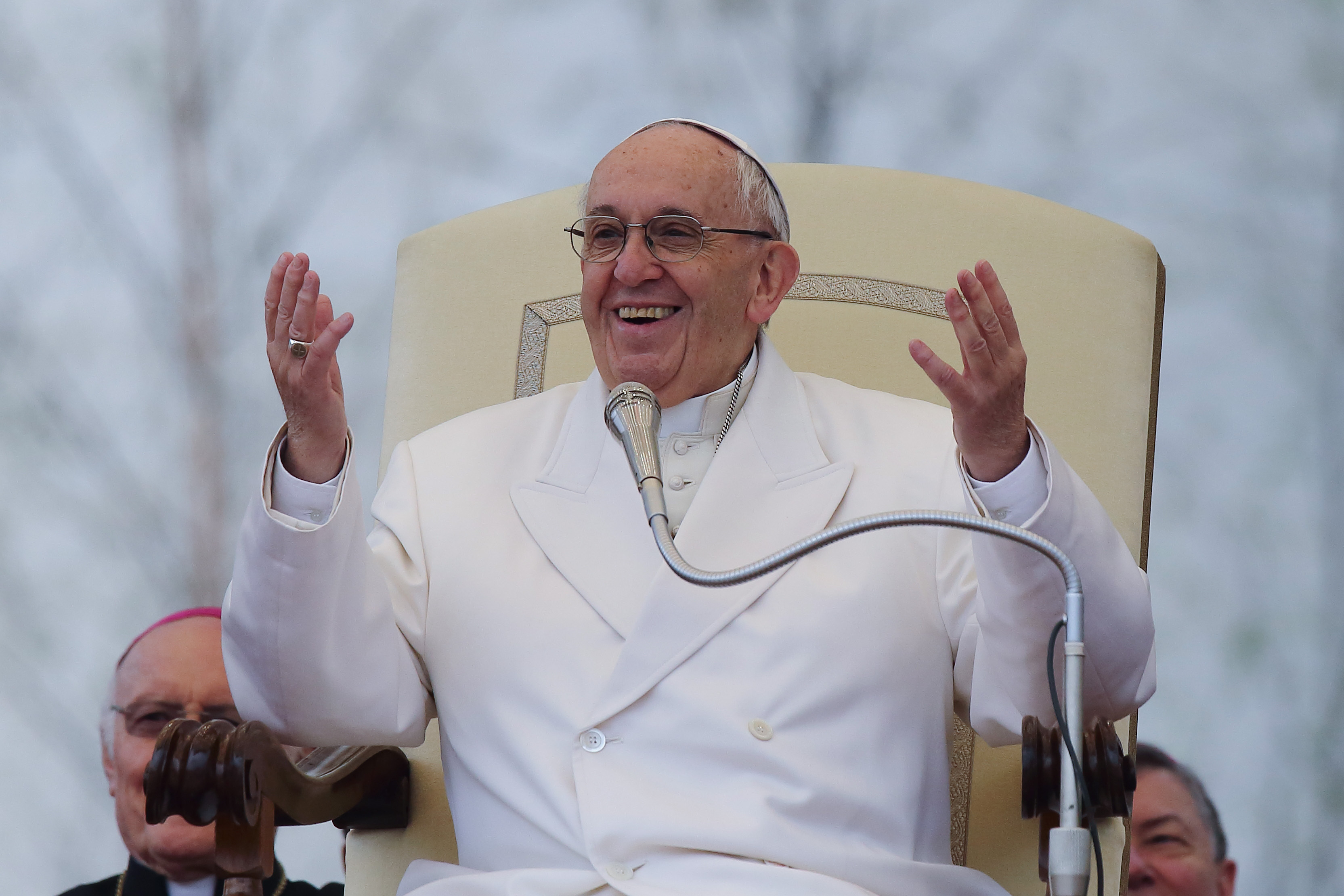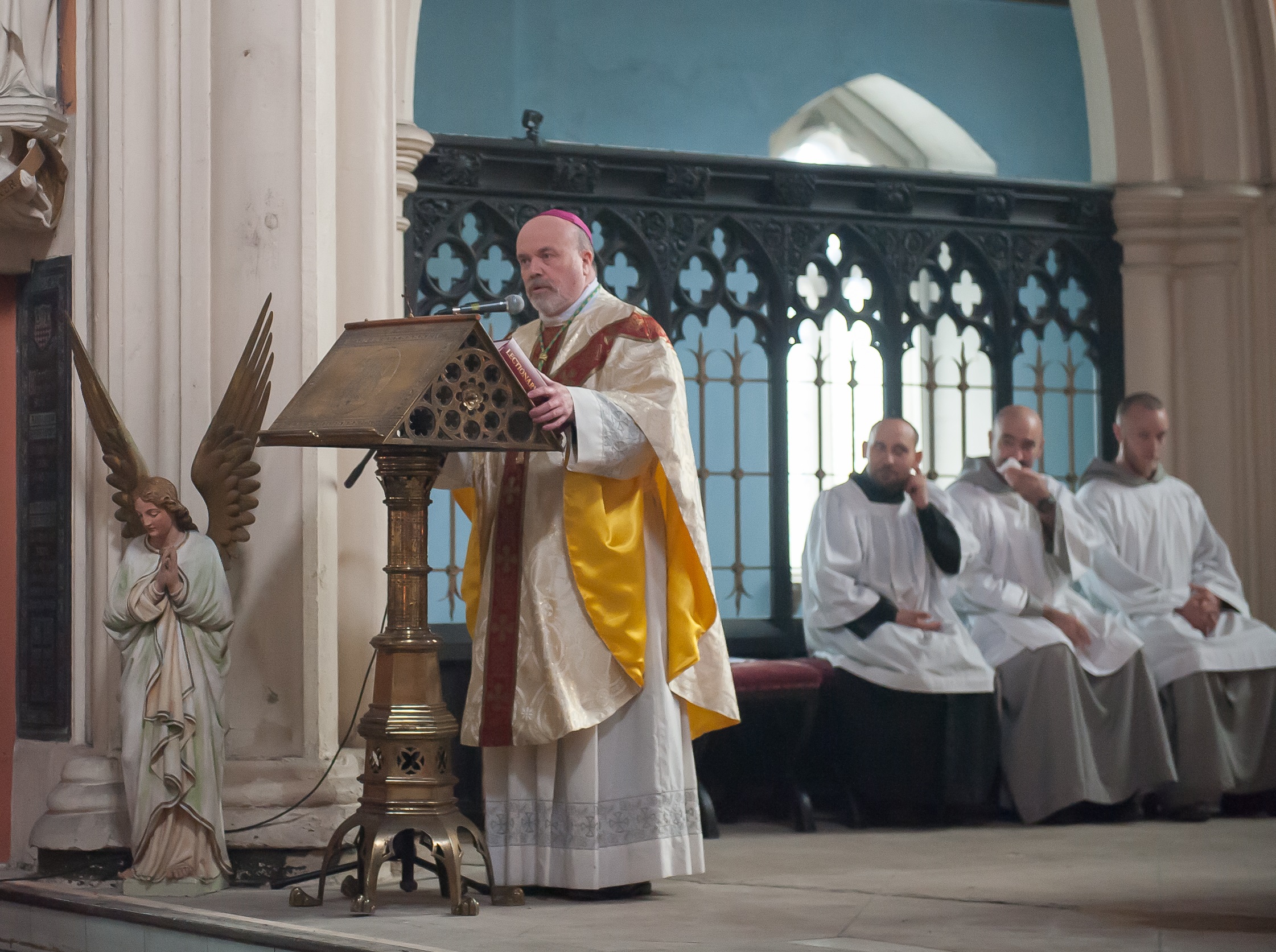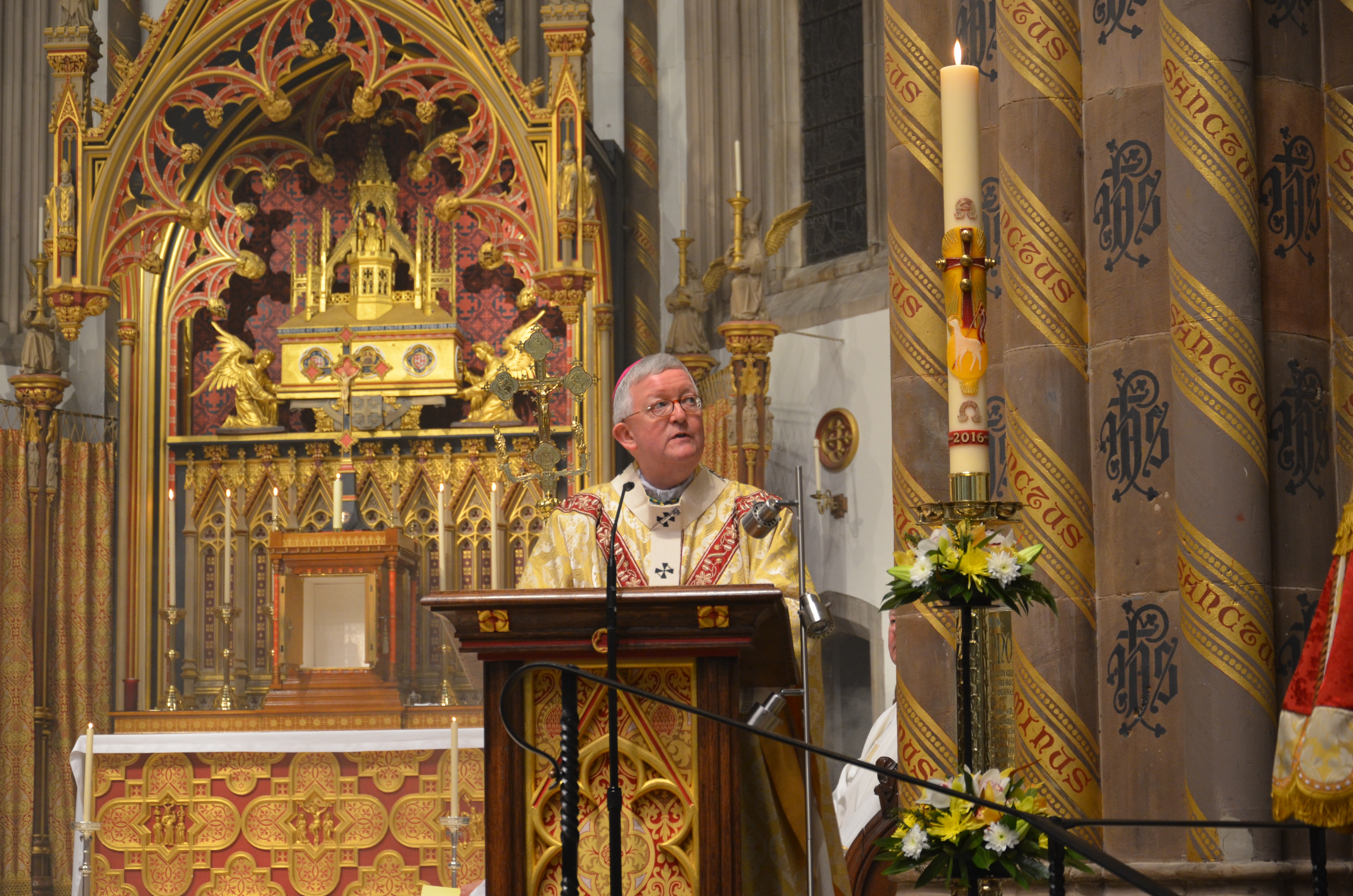Pastoral letter by Bishop of Portsmouth
Philip Egan
This year marks the fiftieth anniversary of the saintly Pope Paul VI’s prophetic Encyclical Letter Humanae Vitae.
It restates the Church’s doctrine on the integrity of sexual intercourse, reserved to a husband and wife in marriage, as an act of love open to life and that these two aspects, openness to life and love, must not be split or artificially separated. Otherwise, the Pope warned, there would be catastrophic consequences for persons, families and society. Years on, we can now see exactly what he meant in broken family relationships, the reduction of sex to a casual activity, the trafficking of people for prostitution and pornography, the sexualisation of the young and the explosion of addictive behaviours leading to despair, shame and guilt.
I invite everyone to revisit this teaching and to reflect on the alternative "spiritual ecology" that the Gospel proposes for family life, when natural methods of fertility and family planning are used. Our diocesan Marriage and Family Life Team are keen to help and to give advice. As a people of life, who celebrate life as a Divine gift, full of meaning, purpose and value, we cannot idly stand by before evil, injustice, suffering and violence in our world, including the abuse of the Earth and its resources. We must act. Next month is the anniversary of Pope Francis’s brilliant Encyclical Letter Laudato Si, in which he begs people to live an authentically human ecology, a more balanced, simple life-style, a life that respects the environment, helps end poverty and espouses justice. It would be good to re-read Laudato Si alongside Humanae Vitae.
As Catholics, we should live an integrally "green" and natural way of life. To do this, of course, given our fallen nature, we need the love of Christ and the life-giving power of the Holy Spirit. Ours is an era of amazing advances in knowledge and technology, from science and medicine to the arts and humanities. Yet the demise of faith and religion, the demise even of people praying, is rapidly undermining in Britain the foundations of ethics.
This dilution of our Christian patrimony threatens to usher in a frightening new Dark Age. No wonder a death-wish is arising for assisted suicide and euthanasia. As Catholics, as people of life, we cannot ignore these challenges. We must act. We must ask Jesus to help us reach out in love to those around, to assist people develop a personal relationship with God. This is fundamental to the mission of our schools and parishes. But more than this, we must enable the Catholic Tradition to engage positively and constructively with culture and society in a mutually enriching conversation. Indeed, in November this year, our Dialogue with Cultural Sectors Team is organising an exciting Symposium called “Science – or - Religion?” It will tackle positively some of the issues that current advances raise: What does it mean to be human? How can we be happy? What does the Gospel say about life?
Read it all by clicking on the heading above
Gaudete et Exsultate
By Pope Francis
114. We need to recognize and combat our aggressive and selfish inclinations, and not let them take root. “Be angry but do not sin; do not let the sun go down on your anger” (Eph 4:26). When we feel overwhelmed, we can always cling to the anchor of prayer, which puts us back in God’s hands and the source of our peace. “Have no anxiety about anything, but in everything, by prayer and supplication with thanksgiving, let your requests be made known to God. And the peace of God, which surpasses all understanding, will guard your hearts...” (Phil 4:6-7).
115. Christians too can be caught up in networks of verbal violence through the internet and the various forums of digital communication. Even in Catholic media, limits can be overstepped, defamation and slander can become commonplace, and all ethical standards and respect for the good name of others can be abandoned. The result is a dangerous dichotomy, since things can be said there that would be unacceptable in public discourse, and people look to compensate for their own discontent by lashing out at others. It is striking that at times, in claiming to uphold the other commandments, they completely ignore the eighth, which forbids bearing false witness or lying, and ruthlessly vilify others. Here we see how the unguarded tongue, set on fire by hell, sets all things ablaze (cf. Jas 3:6).
116. Inner strength, as the work of grace, prevents us from becoming carried away by the violence that is so much a part of life today, because grace defuses vanity and makes possible meekness of heart. The saints do not waste energy complaining about the failings of others; they can hold their tongue before the faults of their brothers and sisters, and avoid the verbal violence that demeans and mistreats others. Saints hesitate to treat others harshly; they consider others better than themselves (cf. Phil 2:3).
117. It is not good when we look down on others like heartless judges, lording it over them and always trying to teach them lessons. That is itself a subtle form of violence.[95] Saint John of the Cross proposed a different path: “Always prefer to be taught by all, rather than to desire teaching even the least of all”.[96] And he added advice on how to keep the devil at bay: “Rejoice in the good of others as if it were your own, and desire that they be given precedence over you in all things; this you should do wholeheartedly. You will thereby overcome evil with good, banish the devil, and possess a happy heart. Try to practise this all the more with those who least attract you. Realize that if you do not train yourself in this way, you will not attain real charity or make any progress in it”.[97]
118. Humility can only take root in the heart through humiliations. Without them, there is no humility or holiness. If you are unable to suffer and offer up a few humiliations, you are not humble and you are not on the path to holiness. The holiness that God bestows on his Church comes through the humiliation of his Son. He is the way. Humiliation makes you resemble Jesus; it is an unavoidable aspect of the imitation of Christ. For “Christ suffered for you, leaving you an example, so that you might follow in his steps” (1 Pet 2:21). In turn, he reveals the humility of the Father, who condescends to journey with his people, enduring their infidelities and complaints (cf. Ex 34:6-9; Wis 11:23-12:2; Lk 6:36).

Annual appeal Sunday for Catholic Care, Weekend 10th /11th March 2018
I write to you today to make the Annual Appeal for Catholic Care, the Diocese of Leeds’s own charitable agency. This Appeal takes place traditionally today on this Fourth Sunday in Lent.
The practice of Penance in the season of Lent, and each Friday in memory of the death of the Lord, is a response to Jesus’ call to conversion and repentancei; to turn away from evil and seek reconciliation with God. The penance which we undertake in Lent can be expressed in many and various ways but, above all, the Church teaches us to do so through prayer, fasting and almsgiving.
This penance, in preparation for Easter Day when we celebrate the resurrection from the dead of Our Lord and Saviour Jesus Christ, is also expressed by performing additional acts of mercy and kindness. In this respect, the giving of alms has always been an important part of Lent.
For many, almsgiving can simply mean donating money to charities or some other good causes. The concept of almsgiving in the Catholic Church though, goes much deeper. It is our response to the call of the Gospel and the Church’s social teaching which encourages us to reach out to people in need and to give a positive expression to our ‘concern for the poor and the defence of justice and right’ii.
Catholic Care does just this! It reaches out to people in need and gives a positive expression to the Church’s concern for those who are disadvantaged, vulnerable and marginalised across the Diocese of Leeds. It is our own Diocesan charitable agency. It cares for and supports hildren and young people living away from their families, adults who have a learning disability and/or mental health issues who want to reach their potential despite the daily challenges they face; children, young people, families and staff in our schools feeling the stress and strains in an increasingly difficult world; and retired priests living in our Diocese....
This work in the community has no statutory funding and much of it has no grants attached to it either. Consequently, Catholic Care relies on the generosity of those who donate to it to deliver these much needed and valuable services. Your help today will enable Catholic Care to continue its mission and develop its services to help those most in need living all around us, our brothers and sisters in Christ.
(Read it all by clicking on the link in the headline. Pic Bishop Marcus Stock preaches a homily at Bradford)

The 50th Anniversary of the Assassination of Martin Luther King on April 4, 1968
The Archbishop of Baltimore, William Lori
We grieve over the many people who lost their lives to gun violence in the City of Baltimore in the year just ended. We are concerned about the urgent need to improve the relationship between law enforcement and the residents whom the police and city leaders are duty-bound to protect. Weighing heavily on our minds and hearts is the sin of racism that continues, sometimes overtly but often subtly, to insinuate itself in our relationships, institutions and communities of faith, including our own. Indeed, the sin of racism has tarnished the soul of our society for so long that racist attitudes can be deeply embedded in our subconscious, such that we may hardly know they are there.
We must bring to light such attitudes and overcome them. Not to be ignored are conditions which create despair and spawn violence in our neighbourhoods: lack of education, unemployment, a dearth of decent and affordable housing; a proliferation of illegal weapons; drug abuse and gangs; the disintegration of the family; homelessness; and so much more. These deep and systemic problems do violence to the dignity of real human beings created in the image and likeness of God.
Even worse is the tendency on the parts of many who see continued decline as inevitable and who react to these harsh realities with indifference or jaded cynicism. In this stark environment, Dr King’s principles of nonviolence are more necessary than ever: they are prophetic words of hope that can light the path forward. All of us need to walk this path of nonviolent hope. Indeed, we should not imagine that Dr. King’s principles apply only to troubled urban neighbourhoods or solely to our African-American brothers and sisters. Violence, racism and a host of social problems exist in different forms and degrees throughout our suburban and rural areas as well. No family, no neighbourhood, no community is immune from violent crime, domestic violence, drug abuse, racism and many other social problems that give rise to an angry and violent way of life.
How often, for example, do immigrants face discrimination, hatred, denied opportunities and even unjust deportation? Think of how vitriolic and coarse public rhetoric has become in politics and the media, a coarseness that often spills over into private conversation. Instead of trying peacefully to reach the common ground of understanding, people far too often and far too quickly resort to abusive language. They may not kill their neighbours with bullets but they do “kill” them with words and gestures of disrespect. The commandment, “Thou shalt not kill,” pertains to all forms of violence against others, including the violence of economic inequality.
Archbishop of Birmingham Bernard Longley
Last Sunday we began Lent by accompanying our Lord as he was driven into the desert for forty days by the Holy Spirit. Today we are invited to climb the mountain of the Transfiguration with the Lord and in company with the apostles Peter, James and John. It is poignant to recall that these are also the three companions that our Lord asked to stay beside him during his agony in the garden of Gethsemane.
When our Lord was in the wilderness, on the mountain-top or in the garden he found the solitude he needed to pray to his heavenly Father. Each of these three environments brought the Lord an opportunity to be close to the Father, at especially significant moments in his life, and to understand more clearly the pathway that now lay before him.
If you have seen Mount Tabor, the mountain of the Transfiguration, you will know that it offers a magnificent view across the countryside of Galilee. Mountains and hills open up a fresh vista of places that are familiar to us - they enable us to see them in a new way. When we climb up into the hills we sometimes gain a clearer vision of another landscape – the one that lies within us.
In the desert we are free from distractions, while on the mountain-top we gain a different perspective. In the scriptures the high places draw those who are called to encounter the presence of God. In today’s first reading Abraham is drawn by God to a mountain in the land of Moriah. There on the mountain-side he is tested. There he is ready to sacrifice his beloved son: your only child Isaac, whom you love. And there his life is utterly changed as his destiny is revealed: I will make your descendants as many as the stars of heaven.
Archbishop of Cardiff George Stack
Fasting and abstinence have nothing to do with hating or despising the world and its material goods. Neither are they ways of punishing ourselves. Fasting is one way in which we deepen our awareness of God. By denying ourselves food or a luxury (the sweets, the cigarettes, the alcohol) what else do we do except say "I do not depend on these things". It enables us to step back from the usual habits and distractions and give particular attention to God. An outward restraint can be a sign and symbol of an inner attention, and a help towards it. This is a meaning of the great symbol of ashes given on Ash Wednesday, the first day of Lent. This is also the Prayer which lies at the heart of Lent. Reminding ourselves to give time to God so that God may speak to us in the silence of our heart.
Archbishop of Westminster Vincent Nichols
In the course of the coming week, the season of Lent begins. It is a time for renewal for each one of us, a time to draw closer to the Lord so that he may pick us up and set us again on his pathway to the fullness of life. The steps we are invited to take during Lent include the three traditional Lenten practices: prayer, fasting and almsgiving. We are to make these practices a more constant part of our life and behaviour throughout these next five and a half weeks. Through daily prayer we open our hearts to the Lord; through fasting, or self-denial, we quieten the clamour within us for self-indulgence; in almsgiving we have a means of reaching out to those in need, giving expression to our compassion for them.
Today I want to encourage you to make almsgiving a consistent part of your observance of Lent. Please consider what you can do to contribute, week by week, to the appeals that will be made, for good work both overseas and at home. In these considerations, I ask you to give a place to the appeal that I make: the Cardinal’s Lenten Appeal. Leaflets will be available next week that explain this in more detail. Do take one and consider the invitation it contains.
Simply put, the Cardinal’s Lenten Appeal enables me to offer funding to new programmes of outreach across the diocese that address some of today’s more pressing problems here at home. In the last year, the generosity of many people to the Cardinal’s Appeal has enabled us to create a new programme of support for prisoners, especially young prisoners; it is helping us to establish a social enterprise initiative to create employment and training opportunities for some of the most marginalised people in our community; it is helping to expand Catholic marriage counselling programmes, as there is nowhere quite as lonely as a deeply unhappy marriage. These are some examples of the work that the Appeal supports in its key areas of social outreach, young people and marriage and family life.
Any Catholic parish, school, charity or organisation is invited to apply to the Cardinal’s Appeal for a grant in support a project that is innovative and effective in touching the lives of those in need in these three areas. It is, therefore, open to you.
The Archbishop of Southwark Peter Smith
Next Wednesday is Ash Wednesday when we begin the Season of Lent, and the readings at Mass will speak to us of the need for prayer, of fasting, and almsgiving. We might be forgiven for feeling a little dispirited and despondent at the prospect: first a day of fasting and abstinence, and then six weeks of penance to come! With that thought in mind I am looking out at the sleet and rain drifting down in the bitter north-easterly wind, and I’m sure that you, like me, long for the first signs of Spring. We are still in the grip of a rather bitter winter, and there remains an undeniable atmosphere of gloom in the world outside my study window – a gloom reflected not only in the weather but in the daily news bulletins which seem to be filled with “bad news” of wars and civil disturbance, drought and poverty in Africa and other parts of the world, the constant threat of terrorism, the upsurge in refugees fleeing their war-stricken homelands and the flourishing of human trafficking – the list could go on and on! Sometimes the darkness and gloom of winter is not simply something outside us, but seems to have invaded our very hearts and chills the very depths of our being. We can go through periods when our faith seems to suffer such a “winter”, a winter which seems so prolonged as to appear endless. In especially dark times we may even feel that we have lost our faith altogether. We can become anxious and fearful; beginning to think that we are being tested beyond our strength and endurance, or even that God has finally given up on us and abandoned us. Then we weep and mourn for the lost times when our faith was strong giving us the power to bear the stormy blasts which assailed us in times past and which came so unexpectedly and for no apparent reason. But the message of Lent is a message of hope and trust in the person of Jesus, our Saviour and redeemer, who says to each one of us, “I am with you until the end of time.” Despite appearances, the winter does eventually come to an end in the glorious new life which blossoms in the Springtime of God’s infinite love and compassion. The Risen Christ is our Light and our Hope. Jesus, our Saviour invites each one of us to follow willingly and generously in his footsteps, and to be led by that light which no darkness can ever overcome. Each day we are invited to die a little more to the sin and selfishness which wounds the life of each one of us, and to grow in the light and love of Jesus Christ. We are invited to enter willingly and generously the narrow gate of prayer, fasting and almsgiving, for that is the way to die to the false self within us and grow into new people formed ever more deeply in the image and likeness of God.
Bishop of Shrewsbury Mark Davies
It is our Catholic faith that “Christ, God and man, makes himself wholly and entirely present” in the Blessed Sacrament of the Altar and that the Sacrifice of Christ, made once on the Cross, is truly made present and its grace applied in the Sacrifice of the Altar. This, the Church’s Catechism explains, is “manifested in the very words of institution ‘This is my Body given for you’ and ‘This chalice which is poured out for you is the New Covenant in my Blood’”.
Yet, we might ask ourselves whether we have allowed the Mass to become reduced in our minds to merely a communal meal and celebration rather than the paschal banquet, the supper of the Lamb of God sacrificed for us? Have we thereby allowed new generations to become bored and uninterested in the Mass, by not allowing them to glimpse the awesome reality of this Sacrifice and Sacrament? Might we also fail to appreciate why the Second Vatican Council taught so clearly that the Eucharistic Sacrifice is the source and summit of the whole Christian life because in every Mass the central event of salvation becomes really present and the work of redemption is carried out.
As Saint John Paul II explained in his last letter to the Church, “This sacrifice is so decisive for the salvation of the human race that Jesus Christ offered it and returned to the Father only after he had left us a means of sharing in it … What more could Jesus have done for us? Truly, in the Eucharist, he shows us a love which goes ‘to the end’, a love which knows no measure”. How, then, could our hearts ever remain unmoved by this love beyond all others? At the Altar, we learn love and sacrifice not only by imitation, but we receive the grace and power to live sacrificial lives in the service of Christ and one another in all of the spiritual and corporal works of mercy. In the Eucharistic Sacrifice, we find the grace and power to live every Christian vocation which leads us to make before the Altar the promises of marriage, of ordination or of the consecrated life.
Bishop of East Anglia Alan Hopes
We shall soon celebrate this great mystery of the Lord’s Passion, Death and Resurrection in Holy Week. But first, as we enter the holy season of Lent, we are given the opportunity to prepare for this mystery.
Lent is a time when we are asked to do three things in particular a little better: prayer, fasting, giving alms. I am sure you will hear more from your priest how you can be helped to do this in your parish.
Whatever we do for Lent, remember to show the same love and compassion to those on the margins of society that Jesus shows for the leper in today’s Gospel and for us as he offers himself for us on the Cross. It is important that we are merciful just as God has been merciful to us.
I hope you will particularly remember to help the two Diocesan supported Lenten charities – Aid to the Church in Need in their work of helping Christians to rebuild their lives and communities in Syria and Iraq, and Don’t Screen Us Out which supports families of children with Down’s Syndrome.
Lent is also a good time to remember those people that you may have put on the margins of your life and need your attention and compassion.
There is a fourth thing to put on that list of three. I encourage you all to make a resolution to go to the sacrament of Confession this Lent. Confession is a bringing of our spiritual leprosy to the Lord, who is both our Sacrifice and our great High Priest.
In this Sacrament, he accepts us and loves us, he forgives us and heals us, he pronounces us clean as it were, and reintegrates us into the life of his Church. No sin is too great for his mercy. No infection of our soul is too far developed for his compassionate and expert hands to heal. Let us come to him during these weeks of preparation and say to him: Lord, if you want to you can cure me! And we will hear him say to us: of course I want to! Be cured!
Bishop of Hexham and Newcastle Séamus Cunningham
As the shortage of priests is increasingly felt across the diocese, the role of deacons in parishes is becoming more important. In these challenging times, the role of the deacon is to help people to exercise their baptismal calling, and not to take over roles already undertaken by lay people. The deacon's role will always remain one of service: service both to the congregations who worship in our churches and service to those who find themselves outside our parishes and, possibly, on the margins of life. That is why, in addition to their ministry in parishes, our deacons also work in food banks, hospitals, nursing homes, prisons, schools, sea ports, refugee groups and shelters for the homeless. In short, wherever the saving message of the Gospel needs to be taken, there is an opportunity for the deacon to live out his ministry. Over the coming months our deacons will be visiting parishes across the diocese, giving an insight into their ministry and how they live out their vocation: a vocation that is rooted in that calling of Christ to serve – the Christ who in our Gospel today called those first Apostles to help him in his ministry, and who, in turn, ordained those first seven deacons to help them in that saving work. Our deacons are supported by the grace they received in their Ordination, by the love of their families, and by the prayers and encouragement of parishioners. I ask you today to join me in giving thanks for their witness and sacrifice. I also ask you also to pray for them, that the Lord will help them to truly live their vocation, a vocation that is nothing less than sharing in the ministry of Jesus Christ as Servant.
Archbishop of Liverpool Malcolm McMahon
Every July, the Liverpool Archdiocesan Pilgrimage to Lourdes takes place. It is a rich experience of faith where over 1,300 pilgrims, sick and healthy, priests and people, travel together to seek Jesus through the intercession of Mary. We are especially blessed to have with us over 500 of our young people who willingly travel overland to help our assisted pilgrims. Those who are sick or need assistance take pride of place at the heart of our week together. Without your support and generosity of service, they would not be able to experience a pilgrimage. In order to sustain our pilgrimage into the future we need you, the people in our parishes, to join us in giving of your time to serve the needs of our sick and assisted pilgrims. Our service of those who are frail is a powerful ministry and an 'act of faith' which not only enables them to experience Lourdes but also enables us to follow the Lord by reaching out to those for whom he has a special care. There is no doubt that those who make the personal sacrifice of making the pilgrimage will gain more than they give. Pilgrims return year after year because the spiritual gifts they receive at Lourdes help them throughout the year ahead.
Many of our faithful helpers have now had to step back from active participation as the years pass, and we urgently need more people to join our healthcare team, Hospitalité, music group, St Bernadette team and youth pilgrims if we are to continue to enable our pilgrimage to be a source of refreshment and renewal for us all. This weekend, every parish, secondary school, nursing home, hospital and hospice will receive this message with a leaflet giving more information about the various sections of our pilgrimage and their roles. We hope that you will take these away with you, read them and seriously consider becoming a part of our pilgrimage family – using the information provided to contact us as soon as possible. We need you and what you have to offer, to bring new life to all our teams. Our sick and assisted pilgrims need you so that they can continue to be pilgrims to this shrine which has provided so much healing for many years. We are 'One Archdiocese' and this 'One Pilgrimage' in the year brings our family together.
Top pic: Archbishop of Baltimore William Lori.





 Loading ...
Loading ...
What do you think?
You can post as a subscriber user ...
User comments (0)